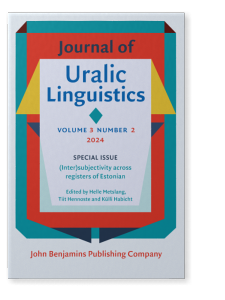Journal of Uralic Linguistics
 nytud.hu
nytud.huLinguistic research on Uralic languages has been undergoing profound and multi-layered renewal as well as extraordinary expansion in recent years. This shift has been marked by the extension of in-depth linguistic work on general linguistic topics of current interest to an ever-growing number of Uralic languages, and the appearance of electronic research tools. The core mission of the Journal of Uralic Linguistics (JUL) is twofold. First, it aspires to serve an integrative role in Uralic linguistics, broadly construed, by striving to bridge currently existing gaps between various research traditions and areas of specialization, providing them with a common platform. Second, it aims to bolster the impact that results from the study of Uralic languages have on general linguistic theory and typology.
The journal brings together formal, typological, descriptive, as well as experimental treatments of data, covering a broad linguistic scope. This scope includes all core grammatical disciplines of linguistics (phonology, morphology, syntax, and semantics), as well as the interdisciplinary fields of research at the interfaces with other disciplines, including phonetics, pragmatics, sociolinguistics, psycholinguistics, language acquisition, language documentation, and language technology, among others. Analyses of data from a single Uralic language/variety and comparisons across languages/varieties (either within Uralic, or between Uralic and non-Uralic) are equally encouraged. Studies that bear on current, topical issues in general linguistics, work on lesser studied and endangered languages and language varieties, and contributions reporting new empirical findings will be especially welcome.
JUL is a continuation of Finno-Ugric Languages and Linguistics and Approaches to Hungarian .
JUL is peer-reviewed and published in English.
Issues
Volume 3 (2024)
Volume 2 (2023)
Volume 1 (2022)
Board
Subscription Info
General information about our electronic journals.
Subscription rates
All prices for print + online include postage/handling.
| Online-only | Print + online | ||
|---|---|---|---|
| Volume 4 (2025): 2 issues; ca. 250 pp. | EUR |
EUR |
Individuals may apply for a special online-only subscription rate of EUR
Private subscriptions are for personal use only, and must be pre-paid and ordered directly from the publisher.
Available back-volumes
| Online-only | Print + online | ||
|---|---|---|---|
| Complete backset (Vols. 1‒3; 2022‒2024) |
6 issues; 750 pp. |
EUR 594.00 | EUR 690.00 |
| Volume 3 (2024) | 2 issues; 250 pp. | EUR |
EUR |
| Volume 2 (2023) | 2 issues; 250 pp. | EUR |
EUR |
| Volume 1 (2022) | 2 issues; 250 pp. | EUR |
EUR |
Submission
Before submitting, please consult the Guidelines.
Articles should be submitted electronically, by email, to the journal editor(s): jul
Ethics
John Benjamins journals are committed to maintaining the highest standards of publication ethics and to supporting ethical research practices.
Authors and reviewers are kindly requested to read this Ethics Statement .
Please also note the guidance on the use of (generative) AI in the statement.
Rights and Permissions
Authors must ensure that they have permission to use any third-party material in their contribution; the permission should include perpetual (not time-limited) world-wide distribution in print and electronic format.
For information on authors' rights, please consult the rights information page.
Open Access
Articles accepted for this journal can be made Open Access through payment of an Article Publication Charge (APC) of EUR 1800 (excl. tax). To arrange this, please contact openaccess
Corresponding authors from institutions with which John Benjamins has a Read & Publish arrangement can publish Open Access without paying a fee. Please consult this list of institutions for up-to-date information on which articles qualify.
For information about permission to post a version of your article online or in an institutional repository ('green' open access or self-archiving), please consult the rights information page.
If the article is not (to be made) Open Access, there is no fee for the author to publish in this journal.
Archiving
John Benjamins Publishing Company has an agreement in place with Portico for the archiving of all its online journals and e-books.
